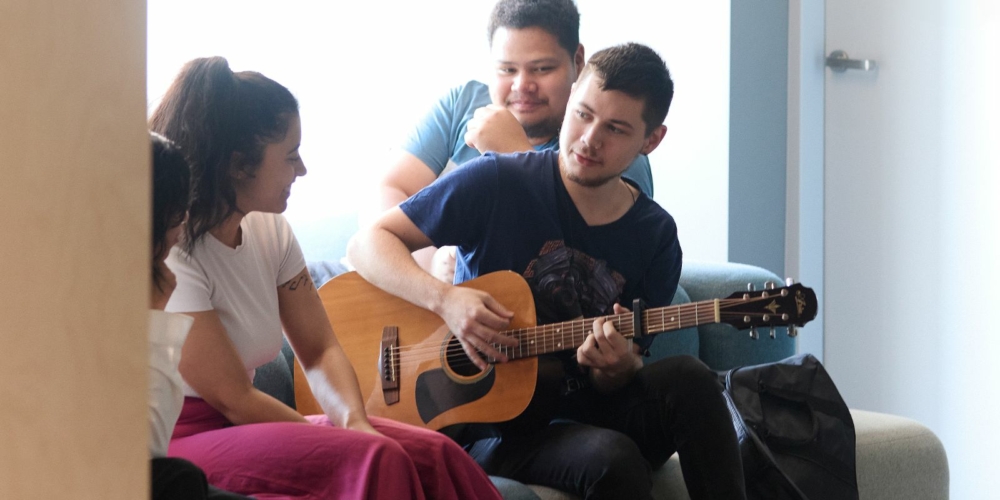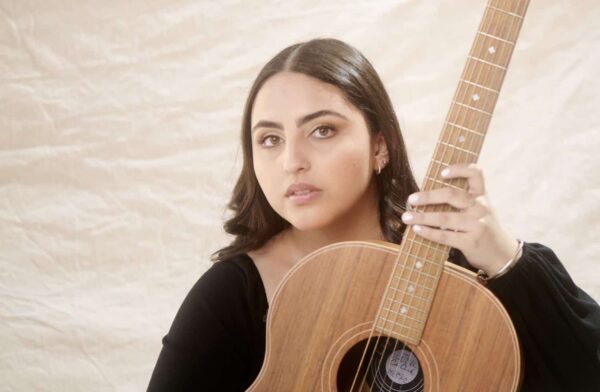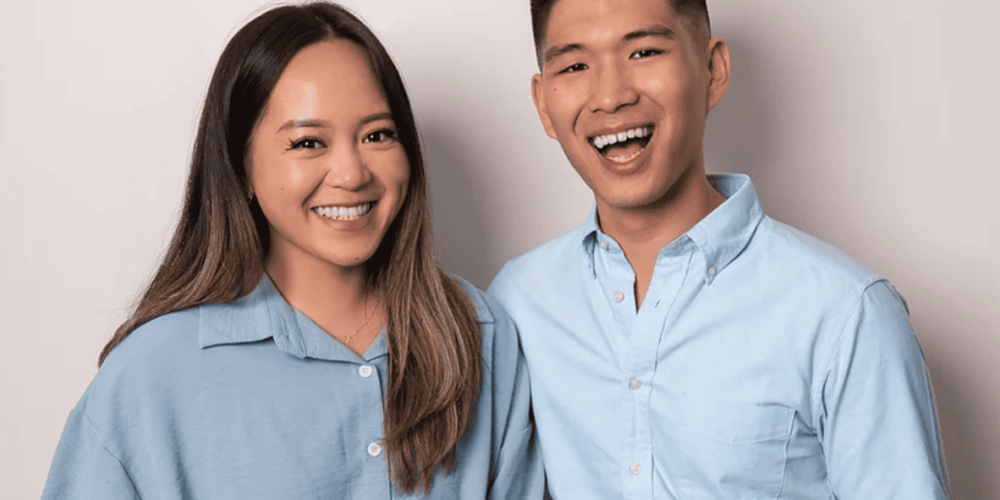Antonia Gauci is an accomplished audio engineer, mixer, producer and artist who has worked with an astonishing array of Australian and international artists including Lil Yachty, DMA’s, Kesha and The Black Eyed Peas. Antonia has engineered dozens of records in a dizzying plethora of genres, working her way up from an internship at BigJesusBurger studios to a four year stint at Studios 301 as in-house engineer and her current gig at Golden Retriever Studios in Marrickville. She deftly switches between production, mixing and engineering and has spent years training her ears by taking on whatever new project came her way.
Antonia started her career here at AIM in Sydney as a student. “AIM was the place that would help me build on the foundations I still use today, and it allowed me to make my mistakes in a safe environment,” she says. She came into her course having taught herself to record with a multitrack recorder, but an absolute rookie when it came to the digital programs she now deploys every day. A ferociously enthusiastic approach to learning and developing her own sound helped Antonia break into one of the most notoriously hard to enter industries on the planet. Antonia’s schedule is packed but wildly diverse. “I’ve just been engineering this Baroque pop record … we did strings, harp, piano, French horn and cor anglais,” she says. “Before that, I did this writing workshop for Indigenous artists, which was incredible. This week, I’m cutting some vocals. There’s also been a bunch of mixes here and there. I’m also writing for my own [widescreen pop music] project, which is always fun.”
WHAT SURPRISES MANY ABOUT AUDIO ENGINEERING
“I don’t think people realise how mentally taxing it can be; how psychologically draining,” Antonia muses. “There’s so much critical thinking and listening that happens. When you’ve got 130 different bits of sound to juggle, some stuff comes together easier, some stuff is more of a mess. You might start a mix seven times before you get it anywhere near what you think might be starting to feel like a song. I start again, all the time,” she laughs.
“There’s a lot of emotion that goes into it as well,” she adds. Someone might be talking about a really heavy situation that they’ve been in and you need to make people feel comfortable while they’re letting that out. [You need to] be able to give people personal space while also making it sound good and making them feel comfortable. There is a lot of stuff happening at the same time, especially if you’re like, hopping in more of a producer role.”
WOMEN IN AUDIO: YOU HAVE TO SEE IT TO BELIEVE IT
It’s no secret there’s a huge gender imbalance in the world of audio. There’s a theory that you have to “see it to believe it” – why it is so important to see women on stage and in roles they never had the chance to take on before, and why Antonia’s story is so inspiring. “I totally believe you need to see it to believe it … I have role models now,” she says. “But maybe 10 years ago, when I stepped out of AIM, I didn’t know one other female engineer (outside of a couple of other students). It was only until I went overseas that I met another one.”
“Every young engineer that I see, I’m just like, ‘you can do this.’ And I don’t do it to try and be a role model. I just want other people to have opportunities that I didn’t have. When I was graduating, I was just like, ‘whoa, it’s a sink or swim, and I need to swim.’ So I’m just going to push myself to see what I can do. I just want other people … for it to be easier for them. It’s really hard. But it can be so great … I have been so fortunate. I’ve had people support me from Day One and give me such incredible opportunities in the early stages,” she says.
“A big thing about this industry: there’s rules, but you can really throw them out the window if you want to.”
– ANTONIA GAUCI
We are endlessly bombarded with stories of overnight success, the tale of the Huge Song that Changes Everything. The reality is, those moments are almost universally fleeting. Breaking big for a moment is nothing compared to real longevity in the business, and that takes patience and sacrifice. “It takes a long time for anything to happen … most people don’t hit any kind of success until they’re in their mid to late 30’s,” Antonia says. “Just don’t give up, it all comes in waves. You could have worked for three years and then be dead for six months or whatever. It’s more about just making sure that you just keep pushing forward and practice and get better. And put the same amount of attention and energy into stuff.”
ADVICE FOR ASPIRING AUDIO ENGINEERS
#1: Be invisible until you’re not meant to be.
“It is an unspoken rule in the studio that you need to be invisible until you’re not meant to be invisible. That’s how I approached it in the beginning.”
#2: Just listen.
“When you’re starting out, no one’s really asking you for your opinion. Just listen. That is actually the demise of many interns, because you’d be working on something and they just start commenting about it. Dude. Don’t do that.”
#3: Fix stuff before you’re asked.
“When I started [working in studios] I saw all this stuff lying around. And I just fixed it or cleaned it up. Then someone would say ‘Oh wow, that’s working, or neater now. Thanks for making the studio a better place’.”
#4: Give it a crack.
“I just try and keep an open mind and be like, there’s something that I’m going to learn from this experience, which will help me keep going … taking initiative is a big deal.”
#5: Drop the ego.
“You really need to be able to listen to the client, but also have really good ears. And there’s a certain level of taste. The way that you listen and put stuff together is your sound and people will come to you for that.”
THE ENDLESS AND RAPID EVOLUTION OF AUDIO
Antonia might wear a lot of hats, but it isn’t at the same time. “When I do my solo stuff, I can’t do the technical stuff at the same time. That’s why I love being in a band with two other really incredible people, because we can all flick between the bits that we need to. That’s also the best part of collaboration – getting the best bits from everyone’s brains involved. And you’re learning all the time,” she says.
“A big thing about this industry: there’s rules, but you can really throw them out the window if you want to,” she muses. There’s always a new way to do something or a new plugin, which changes the whole way that people approach songwriting or mixing. It’s always constantly changing, which is frustrating, but also exciting. Music is just changing at such a rapid rate, and diversity [is improving]. For young women and people from disadvantaged backgrounds, there is more access. You have an iPhone, you can make music on that. And record music on that, and blow up at any second. There’s so many possibilities with what can happen these days. I think it’s really fascinating.” It couldn’t be more creative. “You could give someone the same session to 10 different people and you’re going to get 10 different versions.”
WHY AIM MADE THE DIFFERENCE
“I was quite mediocre at school,” Antonia says, speaking of the traditional education she experienced before she started studying at the Australian Institute of Music, where everything changed. “I just really flourished at AIM, there was something about it,” she says. Whilst she had struggled with maths at school, “I would answer way more difficult maths for acoustics [questions] and things like that [at AIM] … excelling. I think the learning experience at AIM really catered to how I absorb information. And it being so practical [was great]. The staff were just awesome. And the people were just so fun. I’ve had the best time ever hanging around, goofing around,” she laughs.
WHAT IS NEXT FOR ANTONIA
Whilst Antonia’s focus is on bigger picture life goals, “career-wise I’d love to be doing more label work,” she says. “However, I work with a lot of independent artists, which is incredible. There’s actually an album coming out in six or eight weeks … this artist Indira Elias [listen to her new tune “Urania (Beyond The Clouds)” below]. I mixed her record, she’s phenomenal … a dreamy folk kind of thing. She engineered it all herself in her living room. We mixed it together and then sent it to Brian Lucy (Arctic Monkeys, Feist, etc) in the States to master it. It sounds so good. We’re so stoked.”
Check out Indira Elias’s ‘Urania’ on Youtube.




